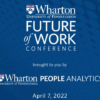On Thursday, April 7, I attended the 2022 Wharton Future of Work Conference, held by the Wharton School of the University of Pennsylvania. Speakers at this year’s conference included Carol Dweck, Stanford University Professor of Psychology and thought leader/mastermind behind the growth mindset concept, Satya Nadella, Chairman and CEO of Microsoft, New York Times Bestselling Author Daniel Pink, as well as University of Pennsylvania Professors Adam Grant and Angela Duckworth.
In a conversation moderated by Adam Grant, Wharton Professor of Management and Psychology, Microsoft CEO Satya Nadella spoke extensively about the importance of companies creating a sense of work-life balance for employees; a survey recently administered within Microsoft revealed that productivity is at its peak immediately before and after lunch hour. However, the remote-working model that has become commonplace over the past two years added a “third peak” of productivity, which occurs in the late evening hours. Nadella emphasized that managers need to establish clear rules and expectations for their employees, so that they are not forced to answer emails late at night. Nadella added that he is continuously learning to refrain from sending emails during weekends. He added: “We think about productivity through collaboration and output metrics, but well-being is one of the most important pieces of productivity … We know what stress does to workers. We need to learn soft skills, good old-fashioned management practices, so people have their well-being taken care of. I can set that expectation, that our people can get an email from the CEO on the weekend and not feel that they have to respond.”
In a talk titled “Beliefs Matter: The Real-World Implications of Individual and Organizational Mindsets,” Stanford University Professor Carol Dweck explained two distinct branches of mindset defined by (1) productivity and innovation and (2) motivation, belonging, collaboration, inclusion, and equity, prior to expanding on the growth mindset concept. Dweck explained that a person with a growth mindset believes that qualities such as intelligence or talent can be developed through effort, good strategies, and mentoring/support, while a person with a fixed mindset believes that these qualities are fixed traits – everyone has a certain amount that cannot be altered. For many years, researchers believed that individuals either had a fixed or growth mindset; however, individuals started thinking if it was possible to establish an organizational culture supported by individuals with purely growth mindsets. Can employees be taught to adopt a growth mindset? And if that is achievable, can you have a growth mindset company? A doctoral candidate studying under Carol Dweck at Stanford suggested that mindsets are not only in a person’s head, but organizational mindsets are created around beliefs that are embedded in company cultures and then expressed through companies’ values, policies and practices. In this view, a company can have a fixed mindset, believing in fixed talent, known as the “culture of genius.”
Alternatively, companies can believe in and commit to the idea that all employees can develop their abilities, which is called a “culture of development.” Dweck shared that when Microsoft began adopting a growth mindset culture, the company focused intently on cultivating the mindset at the team level, in which every team leader was a coach that constantly worked on each employee’s growth; each employee was a coach for his or her colleagues, constantly supporting their growth.
Dweck and one of her doctoral students entered Fortune 1000 organizations and surveyed employees. When employees perceived their company to hold a fixed mindset, they said the company was less likely to foster collaboration (“at this company people are likely to work together”) or innovation (“people are encouraged to be innovative at this company”); instead, employees believed that the company was not in support of them, if they took a smart risk, but it did not work out. Employees also believed that the company did not foster integrity.
WPAC was incredibly insightful, and I would highly recommend the conference to anyone who is interested in or works within Human Capital or People Analytics.
-Aneta Sieminski ’23, Management

